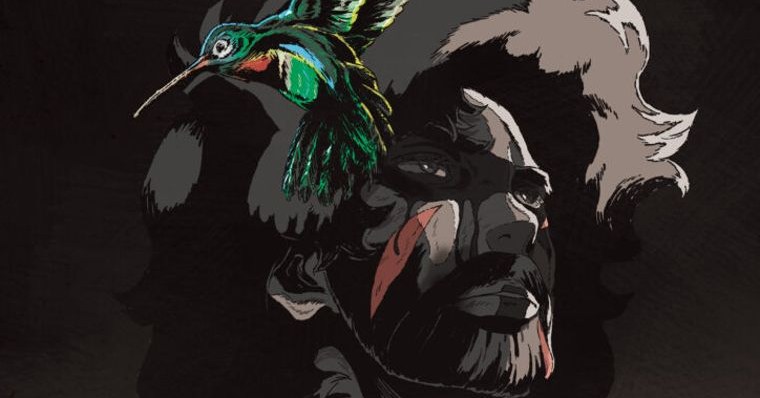
The most human boxing story in recent memory involves piston-powered exoskeletons.
Seven years ago, I wrote about the anime MEGALOBOX, a spiritual successor to the legendary series Ashita no Joe which may actually be called Megalobox or Megalo Box depending on who you ask. I called it a familiar story bolstered by gorgeous art, compelling characters, and a razor-sharp sense of style that even inspired Michael B. Jordan’s direction of Creed III.
Despite a terrific climax that left no obvious dangling threads, TMS Entertainment announced a second season a year later. Two years after that, they released something truly special.
I’ll be stingy with the details. Though its predecessor’s standard-issue underdog story made it relatively spoiler-proof, NOMAD starts in medias res with our hero already at rock bottom. Only as the story progresses and his inevitable comeback begins does it reveal the chain of events that left him a painkiller-addled wreck in the first place.
As a quick refresher: MEGALOBOX takes place in a near-future setting where traditional boxing has been supplanted by the titular sport, which sees its combatants don custom “Gear” to pummel each other with mechanically enhanced punches. Our protagonist, known only by the moniker “Junk Dog,” makes a living throwing fights in mafia-run smokers despite his prodigious talent. Inspired by a run-in with world champion Yuri and supported by his crook-with-a-heart-of-gold trainer, Junk Dog reinvents himself as “Gearless Joe” and attempts to conquer the world.
It’s a conventional boxing narrative chambered in an unconventional casing. It’s barely a spoiler to say that Joe successfully battles his way to a showdown with Yuri; like Balboa vs Creed, Balboa vs Dixon, or Creed vs Conlan, the only mystery is whether our brave protagonist’s victory in the hotly contested finale is literal or moral. In Joe’s case, it’s the former. He stops Yuri in the longest bout the sport has ever seen, puts down the gloves to run a gym with his friends, and sees only a bright horizon ahead.
The obvious question, then, is where to go from there.
Escalation tends to be the approach when looking to extend a narrative. Hajime no Ippo, the 37-years-running boxing manga that doomed my future by inflicting the foul curse of combat sports upon me, had a bad case of this a few years back, only stepping back and reassessing after a much-reviled bout pitted its titular protagonist against an Indonesian ultra-prodigy with a style inspired by monkeys.
Rocky famously followed a similar trajectory; there’s an old, likely apocryphal story that after Rocky IV saw the Italian Stallion overpower the superhuman Ivan Drago, someone on the writing team jokingly suggested that the only rational next step was to have him box an alien. That, as the story goes, is how Predator came to be.
Rather than take that route and risk rising past their optimal altitude, NOMAD’s writers let their focus sink and broaden.
Impeccable as MEGALOBOX’s aesthetic was, the first season left a lot on the table when it came to engaging with it. The classic cyberpunk contrast between civic grandeur and familiar slums, the biomedical tech race for which Megalo Boxing served as a testing ground, the physical consequences of people smashing each other upside the skull with miniaturized industrial equipment; the narrative only explored them them insofar as they directly interacted with Junk Dog’s pursuit of victory.
MEGALOBOX started at Point A, put up a clearly visible finish line at Point B, and invited you to run along with it. It couldn’t take its eyes off the prize for long for fear of stumbling off the track. NOMAD is almost meditative by contrast, a somberly romantic stroll that uses a diverse cast of characters to explore every facet of the sweet science. Where MEGALOBOX was a boxing story, NOMAD is a story about boxing.
Joe’s journey was defined by an all-consuming desire for victory, a willingness to risk everything he had for the sake of claiming victory. NOMAD interrogates both sides of that statement throughout, starting with Joe’s confrontation of his antithesis: “Chief,” the patriarch of a dispossessed Latino community who, like Joe at the beginning of his story, is a terrific boxer but makes a living throwing fights. Where Joe raged against his fate, though, Chief finds contentment.
Contrasting perceptions of victory and sacrifice, both in and out of the ring, define the narrative throughout. Liu, Yuri’s protege, makes it to the top of the Megalo Boxing world but struggles to escape his trainer’s shadow. Mac Rosario, a former fighter and police officer rendered quadriplegic by a bullet wound, returns to the ring with the aid of a revolutionary new spinal implant but suffers side effects that estrange him from his family and himself.
“Grounded” may not seem like the right term for a series like this, but it feels like the right term. The stadium-filling super fights of Season One’s latter half give way to visceral slugfests that truly sell the damage these enhanced punches inflict on flesh and bone. Beyond the in-ring action, Joe’s recovery from addiction is a lengthy, grueling, painful process. And like all great sci-fi, the socioeconomic struggles many characters face, dressed up though they may be in futuristic trappings, are all too timely.
NOMAD doesn’t view boxing through rose-colored glasses, but neither is it cynical. I’d wager that all of us here have, to some degree of depth, grappled with our love and support of a sport so adept at producing tragedy. NOMAD is right there with us, speaking and listening without judgment. Boxing is thrilling. It’s horrifying. It’s redemptive. It’s destructive.
And, sometimes, it’s just a fight.









